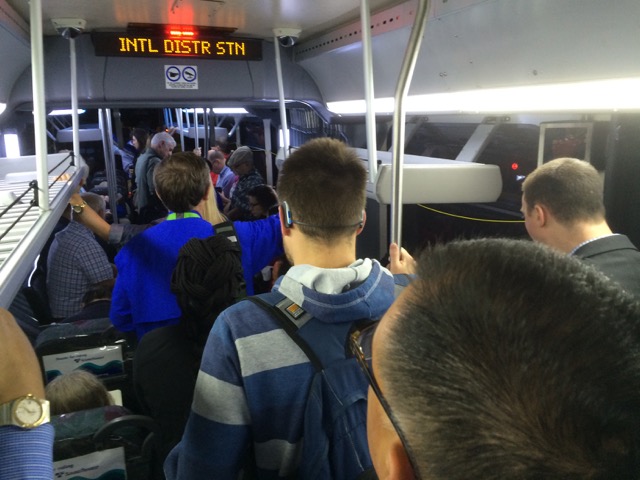A Grand Bargain for Mercer Island

Crushloaded at 6:00am at Mercer Island (Photo by VeloBusDriver)
Zach's report on Mercer Island's East Link comments was disappointing reading. It's clear that not everyone will get everything they want. However, I think there's a path, assuming goodwill from the major players, that meets a goal that I think regional leaders, interested activists, and concerned Mercer Islanders can all agree on. That goal is that the majority of interested Mercer Island residents should have a plausible means of reaching the station.
There are some challenges:
- Parking spots at the station are a precious resource, at 447 not large enough to accommodate likely Link demand (ST projects about 2,000 boardings in 2030, constrained by access limitations) and unlikely to grow significantly.
- Buses are already at crushloads beginning very early in the morning (see photo).
- Banning outsiders outright from the public garage is unlikely to be acceptable to the rest of the region, and rightfully so.
- Although better bus service will help, a significant part of the island will only ever be practically accessible by car.
Although some sacrifices and compromises are necessary, we can achieve the most important goals without vast resource expenditure:
- Metro restructures bus service to coincide with East Link opening. Although Mercer Island routes may have lackluster productivity metrics compared to other investments, Metro should commit to keeping the resources from Mercer Island routes (some currently going over the I-90 bridge) in Mercer Island, and indeed provide further matching funds for service over and above that. An obvious start would be single frequent route on Island Crest Way from QFC to the Link station, with no detour through downtown, through-routed with shuttle to downtown.
- Emphasize I-90 bus transfers at Mercer Island. Although directly contradictory to the aesthetic desires of some residents, providing high quality bus connections to Link at Mercer Island is by far the best way to reduce non-resident parking demand. If Mercer Islanders genuinely want better access to the station, opposing bus transfers actively works against their own interest.
- Satellite Park-and-rides. Regrettably, much of Mercer Island will be impossible to economically serve with transit. Leveraging existing under-used parking assets, like churches, with robust transit connectivity from there to the station will cheaply multiply access to it. Furthermore, these park-and-rides will be deeply unattractive to off-island residents. Collectively, the three non-ST parking lots on Mercer Island averaged 38 of 69 spaces full in 4Q 2014. While better connecting service can activate this capacity, the program will have to expand radically to have an impact.
- Ambitious permit or pay parking. In other locations, Sound Transit has gingerly expanded its permit parking program. While eager to provide more reliable access, Sound Transit fears backlash from users reluctant to pay more to ride. Converting the Mercer Island Park-and-Ride to mostly permits, and aggressively pricing it, accomplishes three things. First, it deters non-residents from selecting Mercer Island station over cheaper alternatives like South Bellevue and Eastgate. Second, it encourages various forms of ridesharing to more efficiently use spots. Third, it provides a revenue stream to fund improved bus service and the additional parking.
If Mercer Island is genuinely focused on transit access for its residents, it should actively encourage priced parking at the station in exchange for a guarantee that Sound Transit will keep the money on Mercer Island to fund local access improvements. This approach would maximize the number of people that can use the station while keeping parking spaces for those who are hardest to serve with buses.
